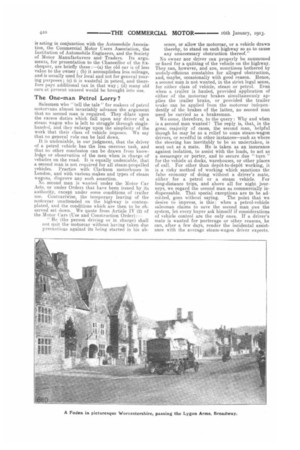The One-man Petrol Lorry ?
Page 2

If you've noticed an error in this article please click here to report it so we can fix it.
Salesmen who "tell the tale " for makers of petrol rnotorvans almost invariably advance the argument that no second man is required. They dilate upon the excess duties which fall upon any driver of a steam wagon who is left to struggle through singlehanded, and they enlarge upon the simplicity of the work that their class of vehicle imposes. We say that no general rule can be laid down.
It is undeniable, in our judgment, that the driver of a petrol vehicle has the less onerous task, and that no other conclusion can be drawn from knowledge or observation of the men when in charge of vehicles on the road_ It is equally undeniable, that a second man is not required for all steam-propelled vehicles. Practice with Clarkson motorbuses in London, and with various makes and types of steam wagons, disprove any such assertion. N o second man is wanted under the Motor Car Acts, or under Orders that have been issued by its authority, except under sonic conditions of trailer use. Contrariwise, the temporary leaving of the motorcar unattended on the highway is contemplated, and the conditions which are then to be observed set down_ We quote from Article IV (2) of the Motor Cars (Use and Construction Order) :—
" He (the person driving or in charge) shall not quit the motorcar without having taken due precautions against its being started in his ab
sence, or allow the motorcar, or a vehicle drawn thereby, to stand on such highway so as to cause any unnecessary obstruction thereof."
No owner nor driver can properly be summoned or fined for a quitting of the vehicle on the highway. They can, however, and are, sometimes bothered by unduly-officious constables for alleged obstruction, and, maybe, occasionally with good reason. Hence, a second man is not wanted, in the strict legal sense, for either class of vehicle, steam or petrol. Even when a trailer is hauled, provided application of either of the motorcar brakes simultaneously applies the trailer brake, or provided the trailer brake can be applied from the motorcar independently of the brakes of the latter, no second man need be carried as a brakesman.
We come, therefore, to the query : Why and when is a second man wanted ? The reply is, that, in the great majority of cases, the second man, helpful though he may be as a relief to some steam-wagon drivers, or needful in other instances—such as where the steering has inevitably to be so undertaken, is sent out as a mate. He is taken as an insurance against isolation, to assist with the loads, to act as a messenger or porter, and to secure due " turn " for the vehicle at docks, warehouses, or other places of call. For other than depot-to-depot working, it is a risky method of working which sanctions the false economy of doing without a driver's mate, either for a petrol or a steam vehicle, For long-distance trips, and above all for night journeys, we regard the second man as commercially indispensable. That special exceptions are to be ad mitted, goes without saying. The point that we desire to impress, is this : when a petrol-vehicle salesman claims to save the second man qua the system, let every buyer ask himself if considerations of vehicle control are the only ones. If a driver's mate is wanted for porterage or other reasons, he can, after a few days, render the incidental assistance with the average steam-wagon driver expects.






















